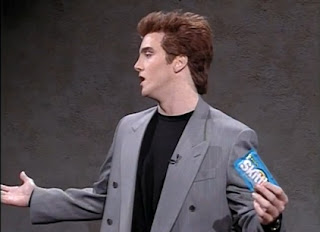Finished - Part Three: The Velvet Pillow

|
| Soon, this will all make sense. Soon. |
In the previous part, we looked at reasons for writing other than the mindless
sex, then there was some stuff about mountain climbing, snacking, and
ultimately I blamed it all on you. It isn’t truly your fault. Writing is a
challenging activity and it should feel rewarding. We should also be able to
look back and feel good about what you’ve accomplished.
Still, we look forward to being completely done as well: when the last plot
change has been laid down and the final semi-colon has been removed. If we
have not grown tired of our characters and have not grown deaf to our own
message, the feeling of finishing should be a penultimate joy. So with all
those finishes, when are we done and who gets to decide?
One of the pleasures of writing is that it doesn’t have a definite end. Unlike
your favorite TV show, or sex, or those hot dog buns you made out of brownie
mix, you can enjoy writing for as long as you wish to continue. It is an
open-ended hobby and does not require others to enjoy. In fact, in some cases
it precludes others. But if part of your enjoyment when writing is publishing,
or finishing, or just moving on to another story, then the problem is knowing
when to stop.
We often stop too soon (said my pile of half-completed ideas) but we also keep
working on a piece too long. We do so at the risk of making it worse. Have you
ever prolonged something enjoyable, like eating a cookie? You take smaller and
smaller bites until you need a roach clip to hold the remainder. When you
finally finish, it leaves you unsatisfied and compels you to get up to have
another.
That’s what writing often feels like to me – an activity that is consistently
enjoyable but which never feels truly finished. I’m not certain what I’m
expecting, but I suspect that all the “finishes” along the way have
desensitized me toward knowing when I have attained what I set out to achieve
in the first place.
That is why I utilized “finishes”: to help me look for clues that I am done.
Perhaps you experience these or something similar, but here are three
completion indicators that may seem familiar:
- Your imagination wanes. This is probably more commonly described as a loss
of passion, but for me, it is a good sign I am done when the process of
imagination becomes forceful and deliberate rather than a process of discovery
…like good sex.
- Your story argues itself out of existence. This is a bit like observing a
matter/anti-matter interaction but at some point the characters, the setting,
or even the genre disproves or undermines whatever point was being made. The
struggle against this is part of the craft, but when it occurs to such a
degree there is no point in continuing, you stop. …or possibly re-brand it as
satire. It’s your call.
- Finally there’s The Lenticular Conundrum – which might be better explained by a metaphor. Have you ever been trying to smooth a velvet pillow? You brush your hand over the fibers to unify them, only to make other marks. You do so again and create more blemishes. No matter what you do, every change you make for the better makes something else worse. When writing this condition isn’t always apparent, or pleasant. At some point, though, your work reaches a state where further adjustment is at best more a matter of taste than improvement or at worse, damaging the piece.
It is hard to notice any of these points while working. That is why being
“finished” and at a stopping point with a draft, or an edit, or an integration
of jazz-age euphemisms can be so important. It allows you to put down your
hands and examine what you have done. Finishes in this example are not moments
for celebration but for reflection. “Should I keep going?” “Should I crumple
it up?” If neither is true and I can objectively say it cannot be further
improved without drastic change, then I believe I am effectively
“finished.”
Why then does “finishing” feel so unsatisfying? I believe it is because we
spend too much time in those self-created moments basking in glory and looking
how far we have come. “I’ve written 5000 words!” “I’ve edited 8 chapters!” I’m
sure that those writers feel good and that they are deservedly proud of how
far they have come, but where are they headed?

|
| “Yeah! 200 Words! Break out the absinthe!” |
It is important to recognize that, although self-created, these moments of
enjoyment are not ingenuine. They are necessary to keep us moving forward;
they are self-encouragement, not self-deception. You do feel good, after all,
when finishing each draft? Is that feeling false? Probably not, unless you are
celebrating the completion of your first paragraph.
We should also recognize it is the self-determined nature that makes these
achievements feel inconsequential. It is why so many people, let alone
writers, seek outside confirmation: publication, recognition, praise. Perhaps
it is that lofty peak which leaves our accomplishments by comparison, seem so
insignificant.
Stop.
Stop right now. Don’t wait for the 100,000th word, or even the 100th. Don’t
think about how you feel. Don’t look at your progress. Instead, think about
why you write. Why do you dawdle hours of your life in front of your computer,
or typewriter, or phone, or fridge? Is it for praise? Is it to make money? You
could do so in other, easier ways. And you don’t get to judge: we are all
whores.

|
You write because there is a drive to put pen to paper, fingers to keyboard,
blood to mirror. You write to contribute. Without writing, you would perish
the slow, vacuous death of those who forswear imagination and possibility: the
life of a houseplant, comfortable, content and forever waiting for an idea
that will never come. And for Friday, which is pizza night.
You may write for spirituality, hilarity, identity, or even spite. You may
write for the irony of emulating those you admire for being different. You may
write for yourself. Regardless the reason, if getting there means taking
breaks to measure your progress, to motivate, to savor achievement, do it.
Drink in that myopic cocktail – one part accomplishment and one part
delusion.
But don’t let the ends be your end-all. I encourage everyone to write for the
beginnings and the middles and everything in between. Enjoy how each word
makes you more You. Then, when you need to stop, prepare for the road to come
rather than just celebrate what you have already finished. You may change your
mind tomorrow, and if you do, that’s okay. As long as you’re writing there
will be more “finishes” ahead.

|
| “...I'm done.” |
Comments
Post a Comment